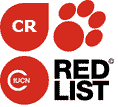Anolis muralla (KÖHLER, MCCRANIE & WILSON, 1999)
Find more photos by Google images search: ![]()
| Higher Taxa | Anolidae, Iguania, Sauria, Squamata (lizards) |
| Subspecies | |
| Common Names | |
| Synonym | Norops muralla KÖHLER, MCCRANIE & WILSON 1999 Norops muralla — KÖHLER 2000: 63 Norops muralla — NICHOLSON 2002 Anolis muralla — TOWNSEND & WILSON 2009 Norops muralla — NICHOLSON et al. 2012 Norops muralla — MCCRANIE & KÖHLER 2015: 111 Norops muralla — NICHOLSON et al. 2018 |
| Distribution | Honduras (Olancho, Parque Nacional La Muralla), elevation 1440-1740 m. Type locality: Honduras, Departamento de Olancho, Parque Nacional La Muralla, along trail to Cerro de Enmedio, 1500 m elevation. |
| Reproduction | oviparous |
| Types | Holotype: SMF 78093 |
| Diagnosis | Diagnosis: A medium-sized species (SVL to 56.0 mm) differing from all other Norops by the following combination of characters: lateral scales heterogeneous; ventral scales perfectly smooth and imbricate; 4-7 rows of irregularly enlarged medial dorsal scales; longest toe of adpressed hind limb usually reaching between ear opening and posterior margin of eye; 0-2 scales between supraorbital semicircles; 5-7 rows of loreal scales; suboculars and supralabials in contact; usually 21-25 (rarely 26) lamellae under phalanges II to IV of fourth toe; a pair of enlarged postanal scales in males; and a small red dewlap with tan to dark brown gorgetal scales. Within the crassulus group, N. muralla differs from N. laeviventris (includes N. intermedius) and N. nebulosus by its much enlargedmedial dorsal scales (only slightly enlarged in laeviventris and nebulosus), longer hind limbs (shank length/SVL ratio of 0.21-0.26 versus 0.17-0.22), greater relative tail length (TL/SVL ratio of 2.2-2.4 versus 1.6-1.8), the small red male dewlap (very small and without particular coloration in laeviventris, and very large and yellow in nebulosus). Noropsmuralla differs from N. anisolepis, N. crassulus, N. haguei, and N. rubribarbaris by having perfectly smooth ventrals (versus strongly keeled). The new species differs from N. amplisquamosus by having the dorsal scales gradually grading into the è ank scales (dorsal scales abruptly enlarged in amplisquamosus) and a red dewlap in males (bright orange in amplisquamosus). Norops muralla can be distinguished from N. heteropholidotus by having small scales irregularly interspersed among the enlarged medial dorsal scales (uniformly large median dorsals in heteropholidotus). Norops muralla differs from N. sminthus and N. wermuthi by having perfectly smooth ventral scales (slightly keeled in N. sminthus and N. wermuthi). For comparison of selected morphometric and pholidosis characters between N. heteropholidotus, N. muralla, N. sminthus, and N. wermuthi. |
| Comment | Species group: Norops auratus Species Group (fide Nicholson et al. 2012) |
| Etymology | Named after the type locality. |
| References |
|
| External links |


